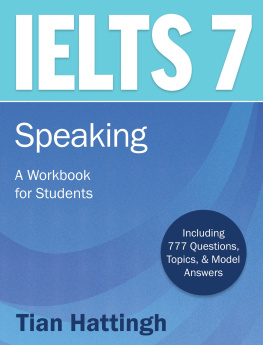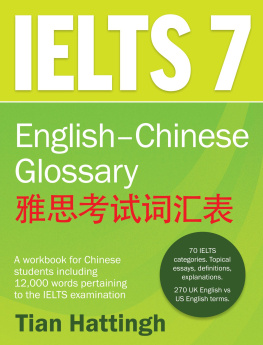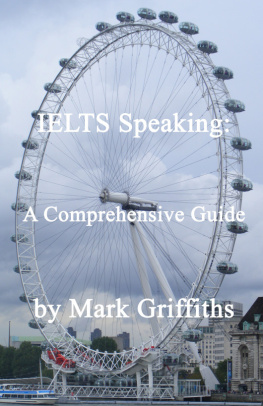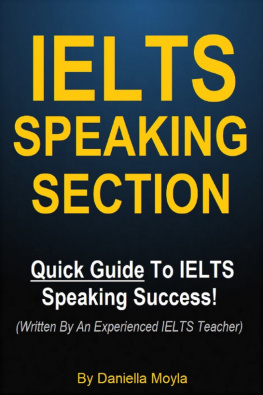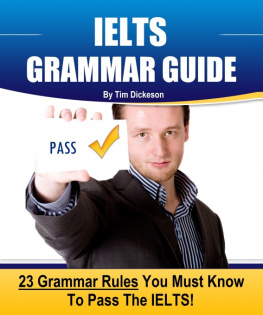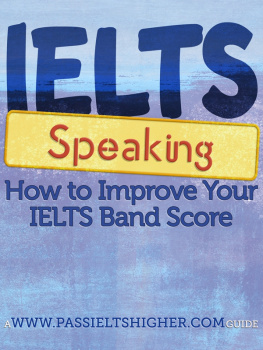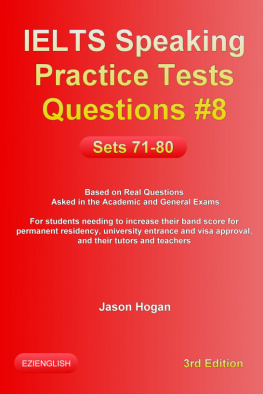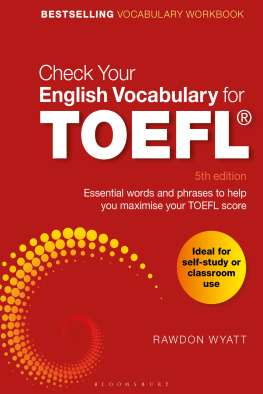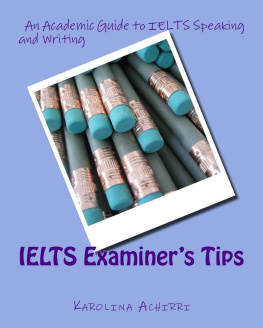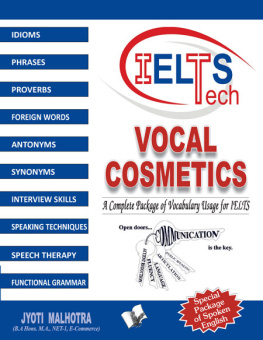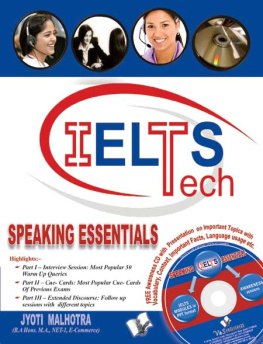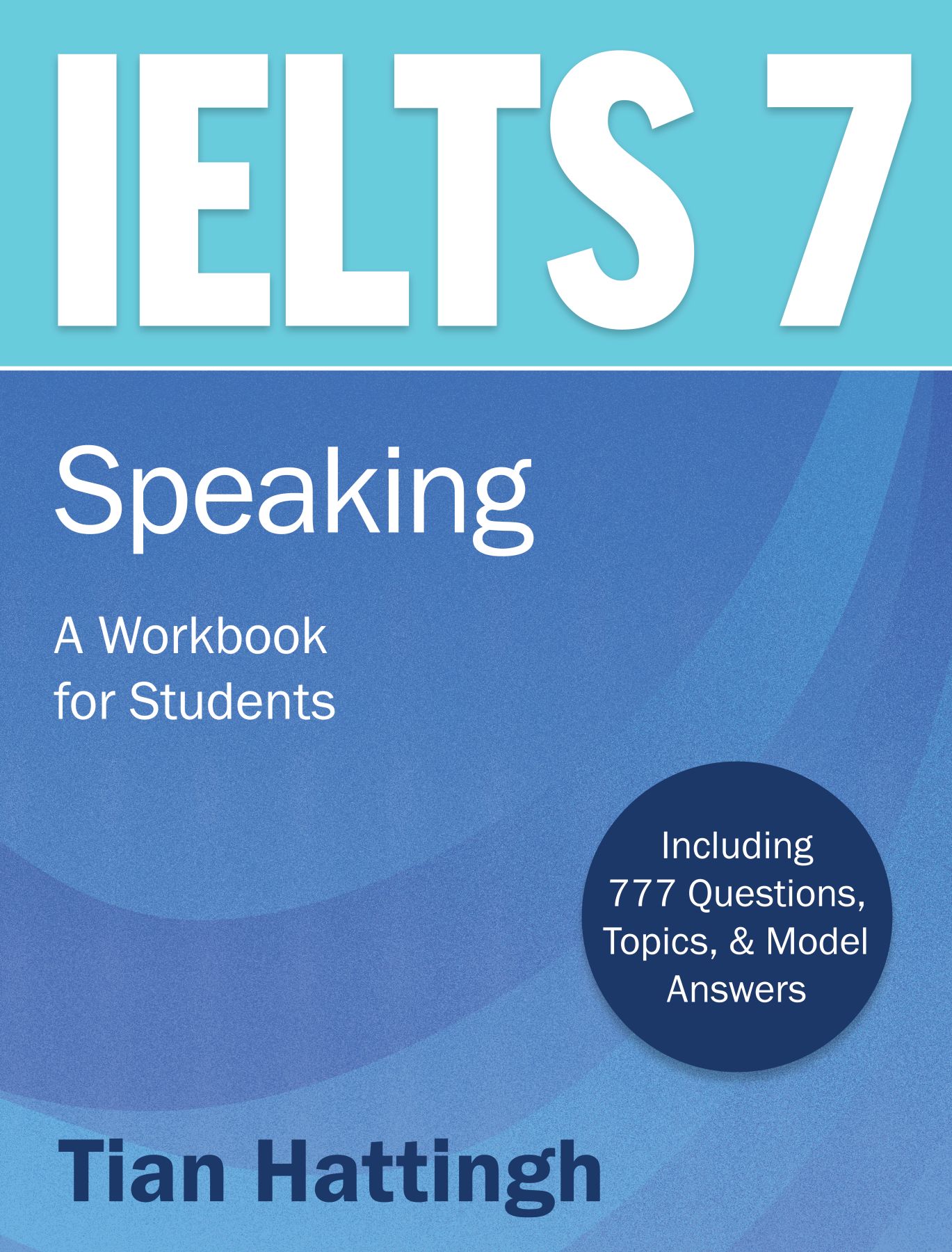
IELTS 7 SPEAKING
Including 777 Questions/Topics and Model Answers
Tian Hattingh

Copyright 2018 Tian Hattingh
The moral right of the author has been asserted.
Apart from any fair dealing for the purposes of research or private study, or criticism or review, as permitted under the Copyright, Designs and Patents Act 1988, this publication may only be reproduced, stored or transmitted, in any form or by any means, with the prior permission in writing of the publishers, or in the case of reprographic reproduction in accordance with the terms of licences issued by the Copyright Licensing Agency. Enquiries concerning reproduction outside those terms should be sent to the publishers.
Matador
9 Priory Business Park,
Wistow Road, Kibworth Beauchamp,
Leicestershire. LE8 0RX
Tel: 0116 279 2299
Email:
Web: www.troubador.co.uk/matador
Twitter: @matadorbooks
This work may contain copyrighted material the use of which has not always been specifically authorized by the copyright owner. Such material is made available for educational purposes, to advance understanding of human rights, democracy, scientific, moral, ethical, and social justice issues, etc. It is believed that this constitutes a fair use of any such copyrighted material as provided for in Title 17 U.S.C. section 107 of the US Copyright Law.
IELTS is a registered trademark of University of Cambridge ESOL, the British Council, and IDP Education Australia. By using this book, in printed and/or electronic formats, readers agree that they fully understand that IELTS-7 is not affiliated, approved or endorsed by University of Cambridge ESOL, the British Council, or IDP Education Australia.
ISBN 978 1789017 250
ISBN (e-book) 978 1789013 030
British Library Cataloguing in Publication Data.
A catalogue record for this book is available from the British Library.
Design, Typeset, and Cover by Scribe Inc., Philadelphia, Pennsylvania, United States

Matador is an imprint of Troubador Publishing Ltd
Dedicated to my father:
Charel Dawid Naud Hattingh
(19292003)
And to my mother:
Margaret Dagmar Hattingh (ne Botha),

who spoke English to me.
CONTENTS
The International English Language Testing System, or IELTS, is an international standardized test of English-language proficiency for nonnative English language speakers. It is jointly managed by the British Council, IDP: IELTS Australia, and Cambridge English Language Assessment and was established in 1989. IELTS is one of the major English-language tests in the world. In 2016, three million tests were taken in more than 140 countries.
IELTS is accepted by most Australian, British, Canadian, and New Zealand academic institutions, by more than three thousand academic institutions in the United States, and by various professional organizations across the world.
IELTS is the only secure English language test approved by UK Visas and Immigration for visa customers applying both outside and inside the UK. It is also a requirement for immigration to Australia and New Zealand. In Canada, IELTS is accepted by the immigration authority.
No minimum score is required to pass the test. An IELTS result or Test Report Form is issued to all test takers. Test takers receive a score for each test component: Listening, Reading, Writing, and Speaking. The individual scores are then averaged and rounded to produce an overall band score.
Institutions are advised not to consider a report older than two years to be valid unless the user proves that he or she has worked to maintain that level.
The IELTS test has four parts: Listening, thirty minutes (plus ten minutes transfer time); Reading, sixty minutes; Writing, sixty minutes; and Speaking, eleven to fourteen minutes. The total test time is therefore two hours and fifty-five minutes.
Listening, Reading, and Writing are completed in one sitting. The Speaking test may be taken on the same day or up to seven days before or after the other tests.
All test takers take the same Listening and Speaking tests, while the Reading and Writing tests differ depending on whether the test taker is taking the Academic or General Training versions of the test.
On Friday afternoon, October 25, 2002, I stepped off a plane at the Hongqiao Airport in Shanghai. Before accepting a job offer in the Peoples Republic of China, I had only a vague idea of where China was. Until then, I had never been to a Chinese restaurant and had only heard of chopsticks. I had never noticed a Chinese character before and had certainly never heard someone speak Mandarin and/or Cantonese.
That was fifteen years ago. Somehow I virtually never experienced the culture shock monster so notoriously dreaded by expats. I simply accepted all things strange and amazing (and even annoying) as they were.
Like many a rookie ESL teacher before and after me, I too in good faith attempted to reform the Chinese educational system in its entirety. But that also soon faded away into the much calmer waters of When in Rome...
For two years, I was in a learning mode career-wise. I discovered a whole new world of millions of people willing to go to unbelievable lengths to master the language that my mother spoke to me from childhood. I was fortunate to be working in an IELTS training center, where the management procured the services of the chief IELTS examiner in that area. Not only was I able to acquire the knowledge and skills needed to be an IELTS Tutor, but I was also privy to what examiners regarded as worthy of an increase in a band score when evaluating the Speaking and Writing components of the test.
Early in 2016, I relocated to Vietnam. Seeing that IELTS is an international testing system and they go to great lengths to ensure that their standards are maintained globally, I had no problem adapting my knowledge and experience in a new cultural setting. IELTS students in Vietnam have the same goals as their peers in other non-English-speaking countries.
Over the years, I have spent time with a myriad of students, listened to an infinite number of speeches, and read more essays than traditional language teachers do in a lifetime. And I still enjoy it. The reason is that students studying IELTS for Academic Purposes have an unwavering desire to be accepted by a foreign tertiary institution and are generally speaking much more committed to their studies than their counterparts who aspire to know the language for other reasons.
To me, this makes the job of being an IELTS tutor much more satisfying than teaching a class of thirty to seventy school and/or college students. Others, undoubtedly with much more guts and character than me, are well suited for the latter.
The objective of this publication is to give those students studying IELTS for academic purposes a large amount of IELTS topics that they could face in the Speaking test. These are accompanied by suggested answers that will provide them with some fresh ideas that they can use when taking the test.
I would like this publication to be known as a no-nonsense book, only presenting information that is essential in improving skills and band scores. The target population are those students aiming to achieve a IELTS band score between 5 and 7 in the Speaking component of the test. The level of the language used in the suggested answers and essays reflect this aim.
Next page
